#the chesterton challenge
Text
The Unprintable News
All the planes that safely flew
All the crimes folks didn't do
The men who lived their day unharmed
Free from danger and alarm
All the bridges that don't break
The parts of Earth that never quake
The homes that stand untouched by flame
Those who of crime are never blamed
The friendly dogs who never bite
The folks who sleep safe through the night
All the simple kindly deeds
That offer help to those in need
With headlines shouting all that's black
My news provides the truth they lack:
Although this world has fear and fright
Much more often, things go right
439 notes
·
View notes
Text
The Chesterton Challenge: Official Announcement
G.K. Chesterton was an extremely prolific writer and artist with a vast lifetime output of just about every kind of writing there is--novels, essays, articles, poems, biographies, short stories, etc.
His birthday is in May.
To honor both of these things, the Inklings Challenge blog is going to devote the month of May to hosting the Chesterton Challenge.
The Challenge
The Chesterton Challenge is an event that challenges Christian creatives of all kinds to create something every day of May--be it a story, drawing, poem, doodle, meal, sculpture, sentence, puppet, essay, scribble, portion of a project, whatever. If it involves making something, it counts.
Every day throughout May, there will be a post on the Inklings Challenge blog with a completely optional prompt to inspire creative works. People can then reblog that post either showing us or telling us about what they created that day.
Participants may interact with as many or as few days as they like, and are welcome to join in at any point during the month.
Any questions may be directed to the Inklings Challenge blog via ask or DM.
And that's the Chesterton Challenge! Now go forth and create!
100 notes
·
View notes
Text
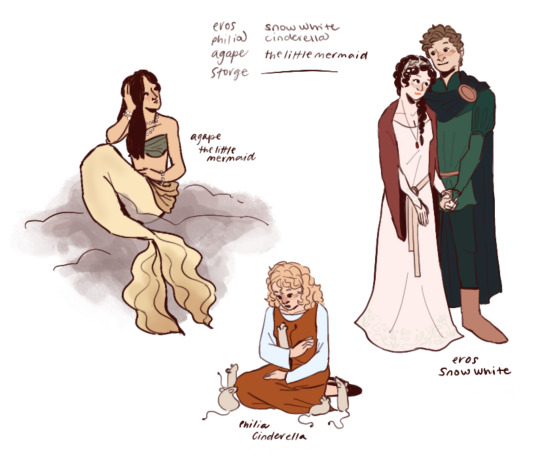
The Chesterton challenge + the four loves challenge - fairytale
digital
Did I forget to post this two months ago
yes yes I did
42 notes
·
View notes
Text
Today I did a quick drawing inspired by this post from @braywashed. I really liked Pretty Deadly's outfits in these gifs, so I drew Celegorm and Curufin in them, wrestling with Galadriel and Finrod (not pictured; he's currently dragging Celegorm out of the ring)
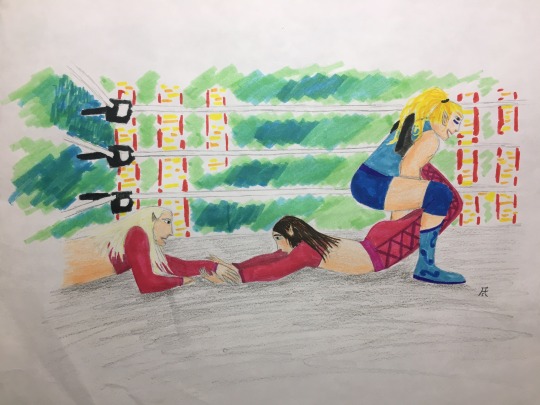
I am also going to count this drawing for Day Twenty-five: Home for the Chesterton Challenge, since I drew this in my home.
#galadriel and finrod are winning right now; they are both absolutely feral in wrestling#(to be fair so is celegorm but he wasn't the one who fought a giant wolf now was he)#though curufin is the best of the four at strategy (though it's close) and definitely at finding loop holes#and celegorm and curufin work together better as a team#so all in all each of their matches against each other could go either way#anyway#I have no idea how wrestling works so please forgive the inaccurate details#and backgrounds? what are backgrounds? XD#celegorm#curufin#galadriel#pretty deadly#my art#silm#silmarillion#silm art#inklings challenge#inklingschallenge#the chesterton challenge
32 notes
·
View notes
Text
@inklings-challenge forgive me for being a day behind, but for yesterday's Chesterton Challenge prompt of "Mystery," here is an excerpt from a mystery story from the world of The Blackberry Bushes, a Morrick Hopeley story by L. D. Melbray, with annotations by Elystan Liddick. This is from the book that he annotated in the Christmas Chapter with the intention of presenting it to Levico as a gift.
(If you're unfamiliar with this, this is my fictional world's equivalent of Sherlock Holmes! So I am writing mimicking that style.)
In all my acquaintance with my friend Mr. Morrick Hopeley, I had never known him to seek out the company of a lady for any cause beyond his professional services.[1] Even his dealings with my Maira, despite the role that she played in the case of the Batsford Murders,[2] dripped with the distant courtesy of a gentleman toward a lady shopkeeper. If he ever had a mother or a sister or an aunt, he has never confided in me,[3] but I doubt not that if he did, he would regard them with his own peculiar mixture of aloofness and polite disdain. Exactly what was his reason for regarding the fair sex in this manner I cannot say with certainty;[4] it was among the unfortunate defects of my friend’s otherwise admirable character,[5] and a fault for which I have dared to rebuke him multiple times.[6] Once, when Hopeley and I shared rooms in Fisher Road, I went so far as to suggest that his aversion stemmed from a secret fear, and was rewarded with utter solitude for the rest of the evening.[7] Yet in the strange case of Miss Celeas Arkwright, which I am about to relate, Hopeley made an exception to his inexplicable rule, for indeed Miss Arkwright was an exceptional woman,[8] and it is by that designation that Hopeley has come to regard her—The Exception.
If I recall correctly, it began in the autumn of 1898.[9] Despite the moderate success of my literary career, the call of the stage once again had compelled me,[10] and I had joined the cast of a respectable, if not grand, production of The Misfortune of Mr. Naym.[11] My role was but a supporting one,[12] yet it provided enough comedic interest to keep me as diverted as our audiences for the next month. I had not seen Hopeley in weeks. If he had heeded my telegram pleading with him to attend my first night if he could, I had missed his unmistakable features among the crowd—no surprise, for my friend is a master of disguise.[13] I expected him to turn up anywhere during our run in some outlandish persona or another,[14] but on this particular night he chose, as ever, to defy my expectations and turned up in my dressing room in his own character after the end of the performance.
The expression on his face, as he leaned against my dressing table, arms crossed over his chest and long legs stretched out before him like a frog’s, plainly indicated that he relished the prospect of startling me.[15] I confess that I took some umbrage at his neglect of my first night,[16] and determined that I would not give him the satisfaction of my genuine reaction to his abrupt manifestation in my private quarters. I flatter myself that I am a creditable enough actor to maintain such a ruse.[17] Without a glance at him, I strode into the dressing room, shed the outermost layers of my costume, donned the dressing gown Maira gave me for Christmas (a quiet brown with a subtle self-stripe),[18] and seated myself at the dressing table to begin the rituals of cold cream, quite as if there were not an absurdly tall and silently perturbed man practically at my elbow.[19]
Halfway through divesting myself of greasepaint,[20] I allowed my eyes to drift in his direction and acknowledged him with a nod.
“Ah,” said I, “Hopeley. There you are, old chap. I see you have been dining with the ambassador of Faysmond—that is, when you have not been taking a lengthy stroll through the countryside near Fifield or acquiring the hobby of brass-rubbing. Between your days at the Coregean Library researching for that case with the bishop’s nephew’s dog, of course.”[21]
A proud beam brightened Hopeley’s thin face. “My dear Wystan,” said he, “you have at least learned to apply my methods. Do tell me, my boy, how you have deduced these things.”
“The answer is simplicity itself,” I remarked. “I read the newspapers.”[22]
[1] Because he has better things to do!
[2] I can’t blame Hopeley. That was the most tiresome part of that book.
[3] Based on his remarks in “The Adventure of the Baboon’s Umbrella,” I theorize that Hopeley’s mother is dead and has been dead for a long time. And if he had a sister, he would have mentioned her by now. I cannot imagine his growing up alongside anyone except Seoras. They wouldn’t hate each other so much otherwise.
[4] He—has—better—things—to—do! This isn’t a mystery.
[5] Oh, your friend has unfortunate defects, Wystan? Need I remind you of what you did when Hopeley needed you most in “The Secret of the Cursed Candlestick”?
[6] I want to read this conversation very very very very very badly. How soon can you write it, Mr. Melbray?
[7] This one too! And he’s wrong. Hopeley isn’t afraid of ladies. He isn’t afraid of anything.
[8] I rather like Miss Arkwright too. She isn’t soppy like Maira.
[9] He does not recall correctly, because in The Batsford Murders, he married Maira in December 1898, and he’s obviously already married to her in this story, which cannot take place any earlier than spring 1899. Perhaps Wystan should try keeping a diary so that he could remember dates correctly once in a while.
[10] So much for “I shall never tread the boards again. I vow it to you, Maira, my own!”
[11] I approve. That is the most amusing play I have ever seen.
[12] Why didn’t you tell us whom he played? Was it Alcidon? It has to have been Alcidon. He’s the funniest character in the whole play, and it would be a shame to waste Wystan on anyone else.
[13] No surprise, for Hopeley wouldn’t bother to disguise himself to go and see Wystan, because he knows that Wystan knows all the costuming tricks and would see straight through him.
[14] As he did in “The Mystery of the Fish-Fry Brotherhood.”
[15] I would have startled him first, but Wystan isn’t quick enough for that.
[16] For shame, Wystan, he has a perfectly good reason! He always does. Nobody cares about your first nights when there’s a case to be solved.
[17] More than creditable. I wish Wystan wouldn’t talk about himself like that; he’s brilliant. Remember “The Businessman and His Cat,” when he convinced everyone that he was the Prime Minister’s secretary?
[18] How could she have given it to him for Christmas if this took place in autumn? This is further evidence that the dating is incorrect. Also, she has hideous taste in dressing gowns.
[19] This is one of my favorite scenes. I laugh so hard that it nearly sends me into coughing fits whenever I reread it.
[20] It is even funnier when you realize that Wystan goes through this whole conversation with his face covered in cold cream.
[21] FOUR cases that you haven’t given to us! I am dying of suspense! Write more! Write faster! I can give you ideas if you want.
[22] But we all know that he could have deduced these things if he wanted to. He just wanted to annoy Hopeley.
#the chesterton challenge#The Blackberry Bushes#The Blackberry Bushes short stories#my writing#Levico Melbray#Elystan Liddick
22 notes
·
View notes
Text
From the grave, I sing
The grave used to call me every night
Sweet whispers and promises of relief
When the world was a silly horizontal line
Monochrome, a floating corpse in the sea
Inside my soul's own marble coffin
So small, tight and claustrophobic
There I was, not even blushing
a hopeless zombie, I think I need a coffee
One day, light broke into my rotten heart
Set me apart as the waters flew
Washing it all like a flood in a film
CGI, special effects, reality renewed
Life! Oh, life — what are you? You burning
scars of deadly love, fast as an arrow
Sharp like a sword! I guess love has to
cost everything to be worth something
To be worthy of giving away my fear
On a silver plate, like it was absolutely nothing
To handle my illusions, identities, plans, hate
My lies, you came down and just crushed it
Now I lay down in the grave of my bed
a little sleep is a little death, time to rest
Time to rise again with the sun, the wheel spun
All is the same, all is waiting under the firmament
But before my eyes are fully closed, I see
The throne shines brighter than ever
The voice of many waters calls me
Home! I remember why I was born
I remember the blood and the thorns
And I sing in tears for I have become salt
Lost drops of holy rivers swallow me
I'm dissolving in the vaults of heaven
There ain't no grave that will keep me quiet
As the trumpet breaks the dimensions of time
While some rise, the grave swallows every too-proud
soul that refused the manifested in flesh Love
And the eternal chord sings...
@inklings-challenge
#ivawrites#poetry#inklingschallenge#the chesterton challenge#poets of tumblr#poets on tumblr#poetry of tumblr#heavenly#ethereal#poetess#poems of tumblr#devotional poetry#christian poetry#holy poetry#prophetic poetry#free poetry#free words#im free#there aint no grave
16 notes
·
View notes
Text
A Letter
I decided to join in the Chesterton Challenge, answering the prompt "Letter."
It gave me the motivation to write a letter I'd been meaning to write for years, from one of my original characters to another, at a certain point in their book series.
It was fun to explore their daily life between books and to see how they'd express (or hide) what they felt about each other at that point in the story.
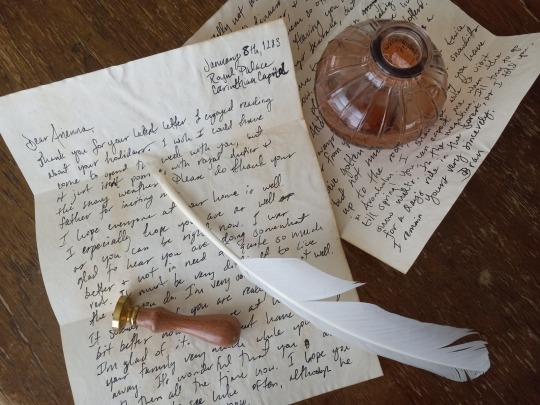
#the chesterton challenge#inklingschallenge#my characters#avonholm series#arienna#bran#letters#words#writing prompts#writing challenge#thank you for the excellent writing prompt#Inklings Challenge!#it really helped me be creative this weekend#I decided I wanted to participate in a challenge like this someday or next time#and then I noticed the invitation to everyone to join in whenever they want#so I did#it was good for me#and for my writing#and my sweet characters
12 notes
·
View notes
Text
May the Fourth be with You!
And Happy PadMay! In honor of these two events, I wanted to write a little something featuring our Queen, and process some things in my own life. I used today's Chesterton Challenge prompt from @inklings-challenge, although Star Wars style ;)
On days where the HoloNet was filled with holojournal articles filled with the Clone Wars’ worst atrocities across the galaxy, and it seemed like she barely even had time to enjoy her morning caf before having to don her own form of battle armor, Padme wondered if it was all worth it. If anything she did would ever make a difference in the relentless onslaught of violence they faced each day.
On days where she woke up and the pain in her head was like lightning splitting her brain in two, she wanted to close the blinds and crawl back into bed, she wondered if it was all worth it. She wondered what would happen on the day her body told her no, you absolutely cannot work today, you must rest, and what the meddroids would say.
On days where she wanted to cry and comm her mom and jump on her starship to head home to Naboo, to the safety of her mother’s arms and her niblings’ laughter and her hometown, she wondered if it was all worth it. Her niece didn’t understand what she did, not yet. When she was old enough to, would she still look at her aunt the same way?
And yet she kept working, kept trying, at least. She prayed and did her breathing exercises and listened to calming music. She appreciated each moment with her handmaidens, with Anakin, with her fellow Senators, and tried not to take any of them for granted. She tried to tell each of them how important they all were to her.
Maybe the holojournals would forget about Padme Amidala after she retired. Maybe history would remember her as one voice among many.
She would have to find a way to say it was worth it in the end, that she lived her life according to the hope that love and goodness would endure.
#padmay2024#padmay#may the fourth be with you#may the 4th#chesterton challenge#inklingschallenge#padme amidala#star wars#fan fiction#my writing
27 notes
·
View notes
Text
To me the actual best thing about the Aztecs episode is Ian's and Barbara's reaction to One and Cameca. Like One just mentions she exists and Babs taps his chin and calls him an old rogue (I watched that scene five times — never gets old)! And he casually tells Ian that he has a fiancée and Ian laughs and congratulates him — twice! And One just has that 'ugh stop pestering me about my crush *grumbles bashfully*' reaction and agsbnskdgsjsj
#the first doctor#ian chesterton#barbara wright#first doctor era#classic who#doctor who#irrelevant and insensible thoughts#be normal about them challenge impossible
43 notes
·
View notes
Text
Laud Rising
I made a thing for the Chesterton Challenge! Day 18: Friendship.
---
“The typical expression of opening Friendship would be something like, “What? You too? I thought I was the only one.” — C. S. Lewis
---
As a child in the city of Laudness, Katherine dreamed of wonders. The world was dulled and faulty, with days always too hot or too cold, too long with work and too short for excitement; weeks spent first learning her lessons, then her bookbinder’s trade, as seasons passed by. But everywhere around her -- in stories and games, in sky and flowers, in the hidden corners of houses and streets -- she glimpsed something more hiding behind. She longed to find that more, to get inside all of these things and away from the plodding irritations of the world-as-it-was.
Her mind was filled with wondrous adventures and brave comrades, victories over monstrous evils and gifts beyond imagining. She devoured old legends of her land’s founding, when the city had first been named -- when the Heroes of Laud had raised the nation into a place of liberty, freeing their people from servitude and protecting the land. Somehow, since then, the shine had been rubbed off the world; nowadays even legends and fairy-stories were unpopular, and Katherine found her books by scrounging alone in the city library.
She learned from other books that other people held her longings too -- learned words for it, words like hiraeth and sehnsucht and nostalgia and joy. And she learned, as she grew older, that the world-as-it-was couldn’t be separated from the wonders she glimpsed in it; even that, maybe, the most legendary heroes had once had to deal with blisters, and boredom, and dullness -- but that even so, the thrill of a sunset or a goose-call were just as much a part of her world as the blisters. But even as she learned to accept these things, to weave her dreams into the fabric of daily life without letting them be more than that, it only made some of them only sharper, clearer, more distinct with time.
Because Katherine dreamed of heroism. The more she grew to love the world as it was, to see the longed-for as only hidden under stains in its fabric, the more fiercely she dreamed of fighting for all the good that it held. She burned with the need of it -- but how, how, how? There was nothing so simple as a dragon to slay, in their nation; there were human problems instead, like corruption and falseness and poverty. She was no warrior, anyway, and no leader -- she wasn’t even particularly good with people. She was smart, she’d learned that, but staring at the troubles of the world was more like staring at the Gordian knot than anything else. It needed something other than her mind to fasten on a starting-point, and so she could only freeze in indecision.
But she could see what the world could look like, with those threads untangled -- what it could look like if it were washed clean. And from her books and stories, she could imagine the type of people that could start such a fight.
What she could do was what she had always done; daydream, spinning beauties and wonders together into tales.
So she began, at last, to share the little she had, and told her stories, for want of better things to do.
She began writing: fables and adventures and quests, telling them at first to whoever would listen, then selling them to whoever would print them -- binding them herself, if she had the time and paper. Stories of what the world could be, of the kind of heroes that could fight its evils, cast into the molds of her favorite legends; new tales of the Heroes of Laud, their Captain-King and his wise Queen, the Minstrel and the Steward and all the other famous figures, turned into her new heroes. She put her dreams and longing put out into the world, begging someone to take them up, to do what she couldn’t.
Begging for someone who could see in her dreams all that she could, and more.
Then, one day, a young man knocked on her door. “You printed this,” he said, eyes shining, and held out her first book: The Rising of Laud, half-a-dozen stories inside an amateur cover. “Do you know the author? I haven’t been able to find them yet, but this is their first work --”
“Why do you want to know?” she asked.
He looked down at the book, then back up again. “I’ll sound mad if I tell you the truth,” he said gravely.
Katherine raised an eyebrow, uncertain what to say. “If you do, at least I’ll know you must mean it?” she offered.
“A very good point.” He breathed in, and then said, “I’ve wanted to meet the writer since I first read their stories, because -- they’re the first stories I’ve ever wanted to come true.”
She stared at him.
“They see things truly,” he continued, as if he thought she didn’t understand. As if he weren’t understanding her as he spoke. “It’s -- it does sound mad, I know, but this is what I want to be --” he gripped the book in both hands, looking down at that worn cover “-- what I will be, if I’m allowed, and I just want to talk to the other person I think wants this.” And then he looked her squarely in the eyes, focused and alight with conviction in a way she’d never been -- but the way she’d always wanted to be helped to find.
Her dreams had never had faces, but she thought that her Captain-King would have hd a face like this.
“I do want this,” she said, somehow unhesitating. “I wrote it -- that’s why I wrote it, to call for someone. But…I don’t know how to help.”
He laughed. “You called, I listened,” he said. “Others might too. And after all --” he held up the book again “--the Heroes have to have their Minstrel, right?”
“I can’t sing very well,” Katherine warned, stepping back from the door to let him in.
“That’s not the important part,” he insisted. He held out the book to her, and she took it automatically as he stepped inside. “You said it yourself, in this -- what’s the role of the Minstrel?”
“She has several.”
But she knew which one he meant, even as she spoke. She ended up saying the line in unison with him -- the tenet of the Minstrel, in more than one tale:
“The Minstrel’s role is to tell the Heroes that they will never be alone.”
And after all, Katherine began to remember, that applied in more ways than one -- not just to the Minstrel's audience, but even to herself.
#my writing#chesterton challenge#i have Written a Thing!#(and i DID check the lewis quote to get correct wording)
21 notes
·
View notes
Text
An ode to the little things
The smallest streams flowing over pebbles
Little blue flowers blooming on the sides of the road
An unexpected hug
Coffee perking first thing in the morning
Freshly painted nails
A butterfly landing on a bush
A nice pen
Clean linens
Cold water on a hot day
Warm sunlight dappled through leaves
Freshly baked bread
A cool looking rock
A pretty harmony
A cat purring
Finishing a task
Unboxing a new bar of soap
Friends around a table
Being warm by a crackling fire
#chesterton challenge#inklingschallenge#anyway this is based on his work on memorialising little things#day 5 chalk
22 notes
·
View notes
Text
After
Someone had to remove the crown of thorns
With its hundred spikes shoved deep into his head
Like all head wounds
They had bled
And bled
And bled
Until He had no more to give
Blood would have dried, crusted, congealed
Around every wicked spine
Someone had to pry each one loose
Gently withdraw it from the tender
(Lifeless)
(Precious)
Flesh
It would have been a Woman’s office
A Mother’s
A Queen’s
To uncrown her kingly, wounded son
If she could have borne it
(How could she have borne it?)
When all her strength and life had drained away
Unthinkable pain
An unthinkable task
Undertaken because of my sin
Lord, have mercy on me
Lord, have mercy on me
Lord, have mercy on me
#poetry#fictionadventurer poetry#the chesterton challenge#i don't think this is how you are supposed to poetry#but despite having many ideas for the mystery prompt of the day#i don't think i'll have time to finish any of them#so you get this half-baked thought from yesterday's rosary#fifth mystery: see what i did there?
83 notes
·
View notes
Text
The Chesterton Challenge: Day 1
Welcome to Day 1 of the Chesterton Challenge! The beginning of a month full of creativity! I can't wait to head on this journey with all of you!
Today's Optional Prompt is: Tradition.
Chesterton was an advocate for tradition in secular and religious contexts, and May 1st is a day associated with all kinds of traditions, from May Day to St. Joseph the Worker to the opening day of writing and art challenges.
You can interpret the word any way you want. Will you write about a fantasy world's traditions? Write an essay about your favorite springtime tradition? Create artwork within a traditional art medium? The sky's the limit!
Whatever you create, make sure to show us or tell us about it by reblogging or replying to this post.
Now go forth and create!
117 notes
·
View notes
Text
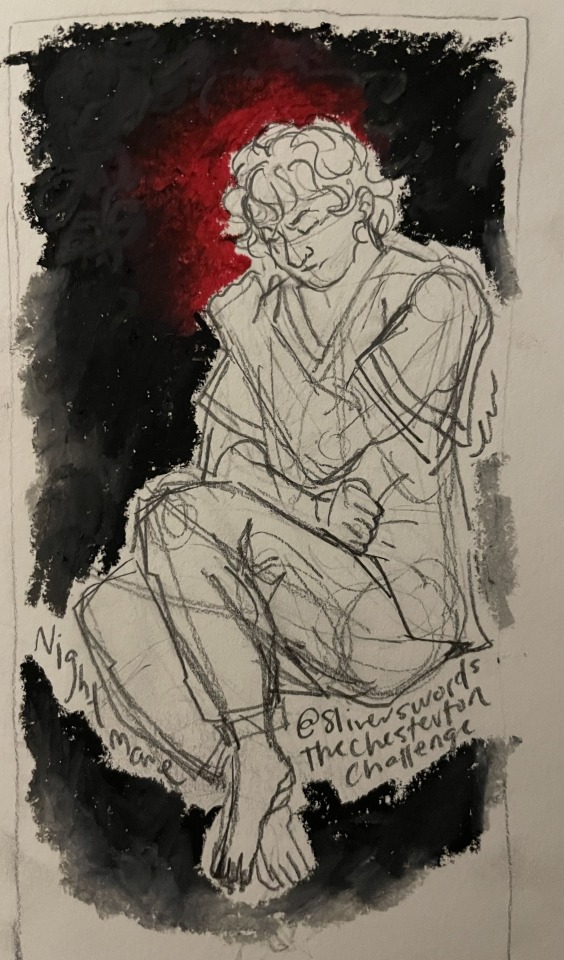
The Chesterton challenge - nightmare
pencil and pastels
#Is this Anakin#Why yes it is#was that my original intention#I’m not sure#my art#the chesterton challenge
11 notes
·
View notes
Text
Day One: Tradition for the Chesterton Challenge
I am mildly cheating by posting a portion of a larger project that is a traditional art medium to fulfill the prompt, but here are photos of the map of LotR I started embroidering yesterday and am continuing today. About half of the red thread is today's work so far. The other half is yesterday's, and I hope to finish all the names in the circle by the end of today.
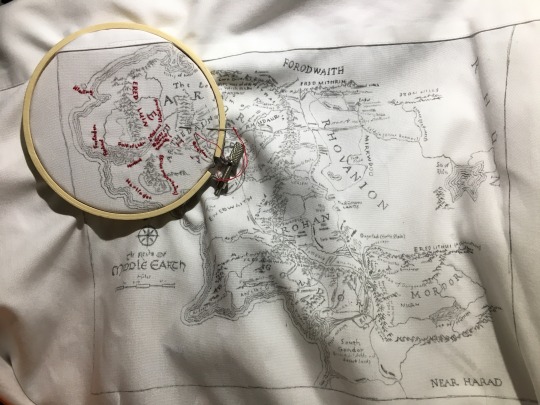
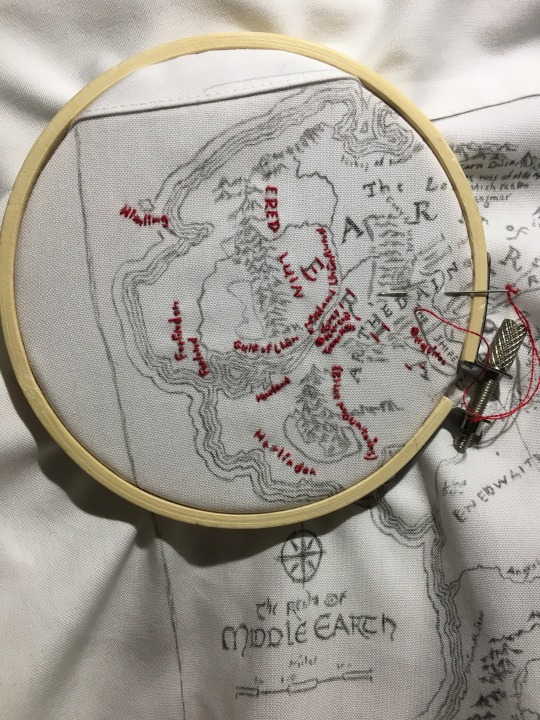
For scale, the hoop is about 4" in diameter on the inside
#If the prompts work out I might just post progress photos of this for each day of the challenge 😆#Though realistically I will probably do a few quick sketches since I'm sure people will get tired of me doing this for every day#inklings challenge#inklingschallenge#the chesterton challenge#lord of the rings#lotr#embroidery#my art
24 notes
·
View notes
Text
@inklings-challenge for day 3's prompt "Sword," here is my latest very unedited addition to the revision of Book 3 Chapter One.
Previously, Tamett just confessed a list of trivial infractions that he thinks might be the reason he's in trouble. Odren reacts, and the conversation turns toward fencing lessons.
In the middle of this speech, the king had risen from his chair and retreated to the fireplace, where he stood with his back to his subject. He seemed to be holding his hand over his face, and he said nothing.
“I will apologize to His Royal Highness too,” said Tamett. “I know I was an embarrassment to both of you.”
The king straightened and turned around. “That will not be necessary. I did not call you here to discuss what you may or may not have done at today’s luncheon. Come here, Tamett.”
Tamett obeyed. At this closer range to the fire, the heat radiated over his already sweltering body. This, he was sure, was just a taste of what eternal punishment must feel like.
The king loomed over him, his face in shadow, his expression unreadable. He reached out a long arm and took something from the mantle. Tamett dared a glance up. The mantle was adorned with a row of photographs in ornate frames. He recognized among them the faces of HRH and the other royal children in their state attire, but the others—stern-faced men and formidable women—were strangers to him.
So was the young man in the frame that the king now presented to him. “Who do you suppose this is, Tamett?” asked His Majesty.
Tamett admitted he didn’t know.
The king seemed somewhat taken aback.
“You do not know your king when you see him? This is me, many—some years ago when I was a pupil at Hollingham College in Corege.”
Tamett studied the figure in the photograph more closely. The young man—boy, actually, for he couldn’t have been more than sixteen or seventeen, was slim and beardless and hopeful-eyed, unrecognizable as His Majesty. He wore a familiar uniform, the jacket and knee breeches of a fencer, and held with careless grace a sabre, as long and straight as his rigid form.
“I won the medal for sabre that year,” said the king. “The boy from Christleton was clever, but I was cleverer—stronger, too. I took that medal home to my father at the end of the term and presented it to him in this very room. He displayed it on this mantle for many years.”
What was one supposed to say to that? Surely the king hadn’t called Tamett in merely to listen to his boyhood reminiscences. Tamett settled on a timid “Congratulations, sir.”
The king replaced the frame on the mantle. “Yes, well, that was a valuable experience for me. Studying fencing in school honed my discipline, my observation, my skill in strategy, my ability to read my opponent. All admirable traits for a future monarch, and they have remained with me to this day.”
The sweat crept down Tamett’s collar again. He was starting to guess where the king was going with this.
“That is why I specifically wished my son to receive instruction in fencing even before he attends a school, to provide him a good foundation. Of course you will have less need of this skill, but my son requires an adequate sparring partner of a comparable size to his own.”
Had the king seen Tamett and HRH stand next to each other recently?
“So I am curious, Tamett. How have these lessons been going? My son’s tutor provides me with regular reports, of course, but I am interested in your perspective.”
This was the real reason Tamett had been called in. He should have guessed, but he had no idea that His Majesty would have found out, and besides, Tamett had acted on HRH’s orders. And as long as he did that, he wasn’t doing anything wrong, right? He was paid to do as HRH commanded. And HRH had never done anything wrong.
Ever.
Tamett gulped. “I think they’ve been going well, sir. I have learned a—a good deal. Thank you very much.”
“What exactly have you been learning?”
Tamett described some of the footwork and blade work he had recently been practicing, demonstrating a little with invisible weapons, painfully conscious of how clumsy his movements became beneath His Majesty’s scrutiny.
“I see,” said the king, when Tamett had exhausted his knowledge. “And how, would you say, is my son doing when you spar with him?”
“Mr. Kempf,” said Tamett carefully, “has praised His Royal Highness’s work. As always.”
“I have no doubt he does. But what is your opinion, Tamett? Tell me how it went the last time you and my son engaged.”
No matter how low Tamett ducked his head, he felt the king’s eyes on him. The flames behind His Majesty flickered, reaching out for Tamett, ready to drag him down into their depths.
“We haven’t, sir,” he whispered.
There was no shock on the king’s face at this admission, only a deeper shade of anger.
“And why haven’t you?”
“His Royal Highness,” Tamett choked out, “has not been attending fencing lessons. I have been going without him.”
#the chesterton challenge#The Blackberry Bushes#The Blackberry Bushes excerpts#my writing#Tamett Lockridge#Odren Callon
17 notes
·
View notes